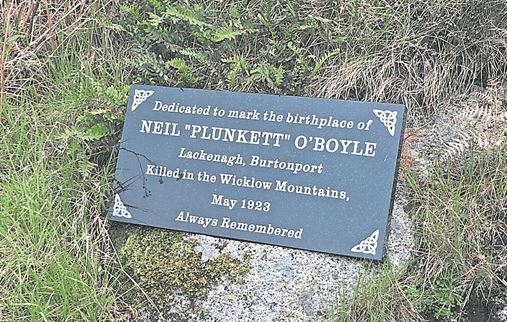By Róise Collins
THE last volunteer killed during the Civil War is to be remembered in his hometown of Kincasslagh today.
Neil ‘Plunkett’ O’Boyle a native of Burtonport, Kincasslagh was killed in May 1923 just two weeks after a ceasefire was called at the end of April.
Local man Danny has been involved in organising commemorations for Neil ‘Plunkett’ O’Boyle since 1983. He said it is very important that the community honour the Donegal volunteer on the 100 year anniversary of his death.
Commemorations have been held locally from as far back as 1925, two years after IRA volunteer O’Boyle was killed in the Wicklow Mountains.
His flying column was the last to be operating against the Free State forces in the Wicklow Mountains at that time. The Ceasefire Order of April 1923 was adhered to by Neil ‘Plunkett’ and his column of twelve men but they stayed in hiding, as did many IRA units, until the situation became clearer.
The column was staying in a safe house in the Wicklow Mountains. In the early hours of the morning of May 15, 1923, Free State forces surrounded the house.
Neil ‘Plunkett’ asked for them to stop firing to allow the women and daughter living there to leave the house, the Free State forces refused.
Plunkett then went outside to surrender, there was an exchange of words between ‘Plunkett’ and the forces before they shot him dead, Danny explained.
There was an inquest into hthe death before his remains were taken by train back home to Burtonport. Here he left behind, his grieving mother and siblings.
His father died when he was only 19 years old, so Neil ‘Plunkett’ had been the “bread winner” in their family.
Neil ‘Plunkett’s mother was a great nationalist who influenced him massively, said Danny.
“After the 1916 Rising the Royal Irish Constabulary got very aggressive in Burtonport. But his mother taught him to stand up to them,” he said.
Neil ‘Plunkett’ worked on the Lough Swilly railway line but because of the harassment he faced during the War of Independence, he was forced to leave his hometown and move to Scotland. There he worked as a miner in a town called Stepps, on the outskirts of Glasgow.
He used the skills he learnt as a miner to break out of prison at a later date.
During his time in Glasgow he was still involved with the struggle, and was caught sending ammunition back home to Ireland. He served 14 months of his five year sentence in Peterhead Prison before being released as a result of Treaty Amnesty. He returned back home to Donegal.
Several months later he was arrested again and sent to prison in Newbridge. Here he utilised his mining skills to dig a tunnel in the sewage drain and escape.
Neil ‘Plunkett’ then made his way to Dublin, where he was later appointed Commandant of the 3rd Battalion, Dublin number 2 Brigade and he took up duty in Wicklow in November 1922.
He was given the name ‘Plunkett’ by his friends because of his affinity to the 1916 leader, Joseph Mary Plunkett. He was very interested in the Irish language and poetry of that time.
“His name has, and hopefully will continue to live on,” Danny said.
Neil ‘Plunkett’ O’Boyle is to be remembered today at the chapel in Kincasslagh where he is buried.
The event organised by The Tír Chonaill Commemoration Committee will be chaired by local councillor Mary Therese Gallagher and the guest speaker is Pearse Doherty TD.
Those attending have been asked to meet at the chapel car park at 3pm.
Receive quality journalism wherever you are, on any device. Keep up to date from the comfort of your own home with a digital subscription.
Any time | Any place | Anywhere










